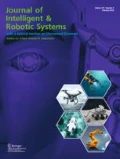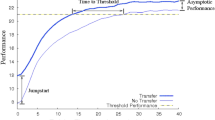Abstract
In this paper we develop a reinforcement fuzzy learning scheme for robots playing a differential game. Differential games are games played in continuous time, with continuous states and actions. Fuzzy controllers are used to approximate the calculation of future reinforcements of the game due to actions taken at a specific time. If an immediate reinforcement reward function is defined, we may use a fuzzy system to tell what is the predicted reinforcement in a specified time ahead. This reinforcement is then used to adapt a fuzzy controller that stores the experience accumulated by the player. Simulations of a modified two car game are provided in order to show the potentiality of the technique. Experiments are performed in order to validate the method. Finally, it should be noted that although the game used as an example involves only two players, the technique may also be used in a multi-game environment.
Similar content being viewed by others
References
Andrecut, M., Ali, M.K.: Fuzzy reinforcement learning. Int. J. Mod. Phys. C 13(5), 659–674 (2002)
Arslan, G., Shamma, J.S.: Anticipatory learning in general evolutionary games. In: Proceedings of the 45th IEEE Conference on Decision and Control, pp. 6289–6294 (2006)
Bryson, A.E., Ho, Y. (eds.): Applied Optimal Control: Optimization, Estimation, and Control. Taylor & Francis, Levittown (1975) (Rev. printing)
Buijtenen, W.M., Schram, G., an H. B. Verbruggen, R.B.: Adaptive fuzzy control of satellite attitude by reinforcement learning. IEEE Trans. Fuzzy Syst. 6(2), 185–194 (1998)
Conlisk, J.: Adaptation in games: two solutions to the crawford puzzle. J. Econ. Behav. Organ. 22, 25–50 (1993)
Dai, X., Li, C., Rad, A.B.: An approach to tune fuzzy controllers based on reinforcement learning for autonomous vehicle control. IEEE Trans. Intell. Transp. Syst. 6(3), 285–293 (2005)
Fudenberg, D., Levine, D.K.: The Theory of Learning in Games. MIT, Cambridge (1998)
Ge, J., Tang, L., Reimann, J., Vachtsevanos, G.: Hierarchical decomposition approach for pursuit-evasion differential game with multiple players, p. 7 (2006)
Ge, J., Tang, L., Reimann, J., Vachtsevanos, G.: Suboptimal approaches to multiplayer pursuit-evasion differential games, pp. 5272–5278 (2006)
Givigi, S.N., Schwartz, H.M.: Swarm robot systems based on the evolution of personality traits. Turkish Journal of Electrical Engineering & Computer Sciences (Elektrik): Special Issue on Swarm Robotics 15(2), 257–282 (2007)
Harmon, M.E., III, L.C.B.: Residual advantage learning applied to a differential game. In: Proceedings of the International Conference on Neural Networks, pp. 1–6 (1996)
Harmon, M.E., III, Baird, L.C., Klopf, A.H.: Reinforcement learning applied to a differential game. Adapt. Behav. 4(1), 3–28 (1995)
Hofbauer, J., Sigmund, K.: Evolutionary game dynamics. Bull. Am. Math. Soc. 40(4), 479–519 (2003)
Isaacs, R.: Differential Games: A Mathematical Theory with Applications to Warfare and Pursuit, Control and Optimization. Wiley, New York (1965)
Ishibuchi, H., Sakamoto, R., Nakashima, T.: Learning fuzzy rules from iterative execution of games. Fuzzy Sets Syst. 135, 213–240 (2003)
Mannor, S., Shamma, J.: Multi-agent learning for engineers. Artificial Intelligence, Special issue on “Foundations of Multi-Agent Learning”, pp. 417–422 (2007)
Merz, A.W.: The homicidal chauffeur. AIAA J. 12(3), 259–260 (1974)
Myerson, R.B.: Game Theory: Analysis of Conflict. Harvard University Press, Cambridge (1991)
von Neumann, J., Morgenstern, O.: The Theory of Games and Economic Behavior, 2nd edn. Princeton University Press, Princeton (1947)
Sheppard, J.W.: Colearning in differential games. Mach. Learn. 33, 201–233 (1998)
Starr, A.W., Ho, Y.C.: Nonzero-sum differential games. J. Optim. Theory Appl. 3(3), 184–206 (1969)
Takagi, T., Sugeno, M.: Fuzzy identification of systems and its application to modeling and control. IEEE Trans. Syst. Man Cybern. 15, 116–132 (1985)
Wang, L.X.: A Course in Fuzzy Systems and Control. Prentice Hall, Englewood Cliffs (1997)
Weibull, J.W.: Evolutionary Game Theory. MIT, Cambridge (1995)
Yeung, D.W.K., Petrosyan, L.A.: Cooperative Stochastic Differential Games. Springer, New York (2006)
Author information
Authors and Affiliations
Corresponding author
Rights and permissions
About this article
Cite this article
Givigi, S.N., Schwartz, H.M. & Lu, X. A Reinforcement Learning Adaptive Fuzzy Controller for Differential Games. J Intell Robot Syst 59, 3–30 (2010). https://doi.org/10.1007/s10846-009-9380-4
Received:
Accepted:
Published:
Issue Date:
DOI: https://doi.org/10.1007/s10846-009-9380-4




